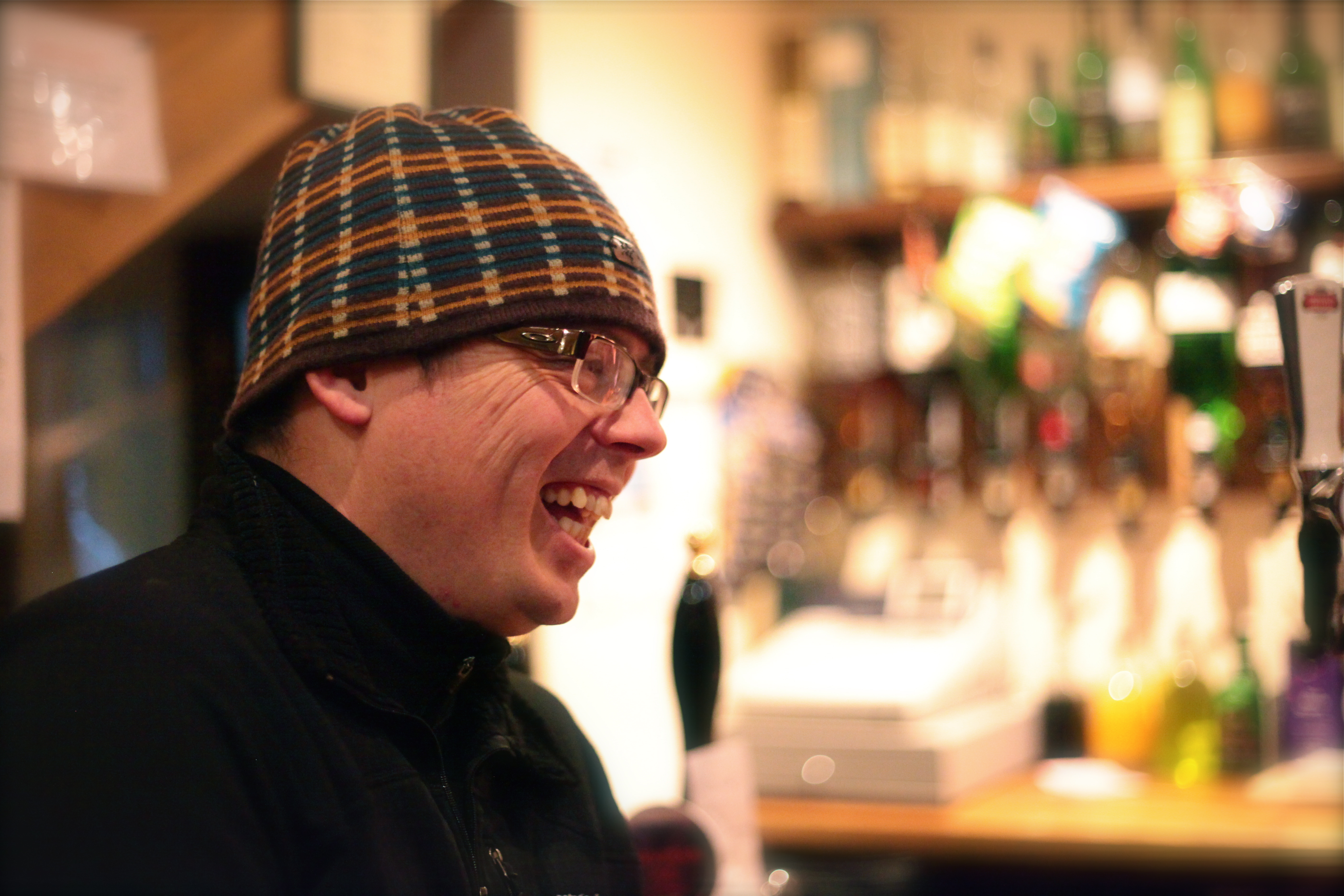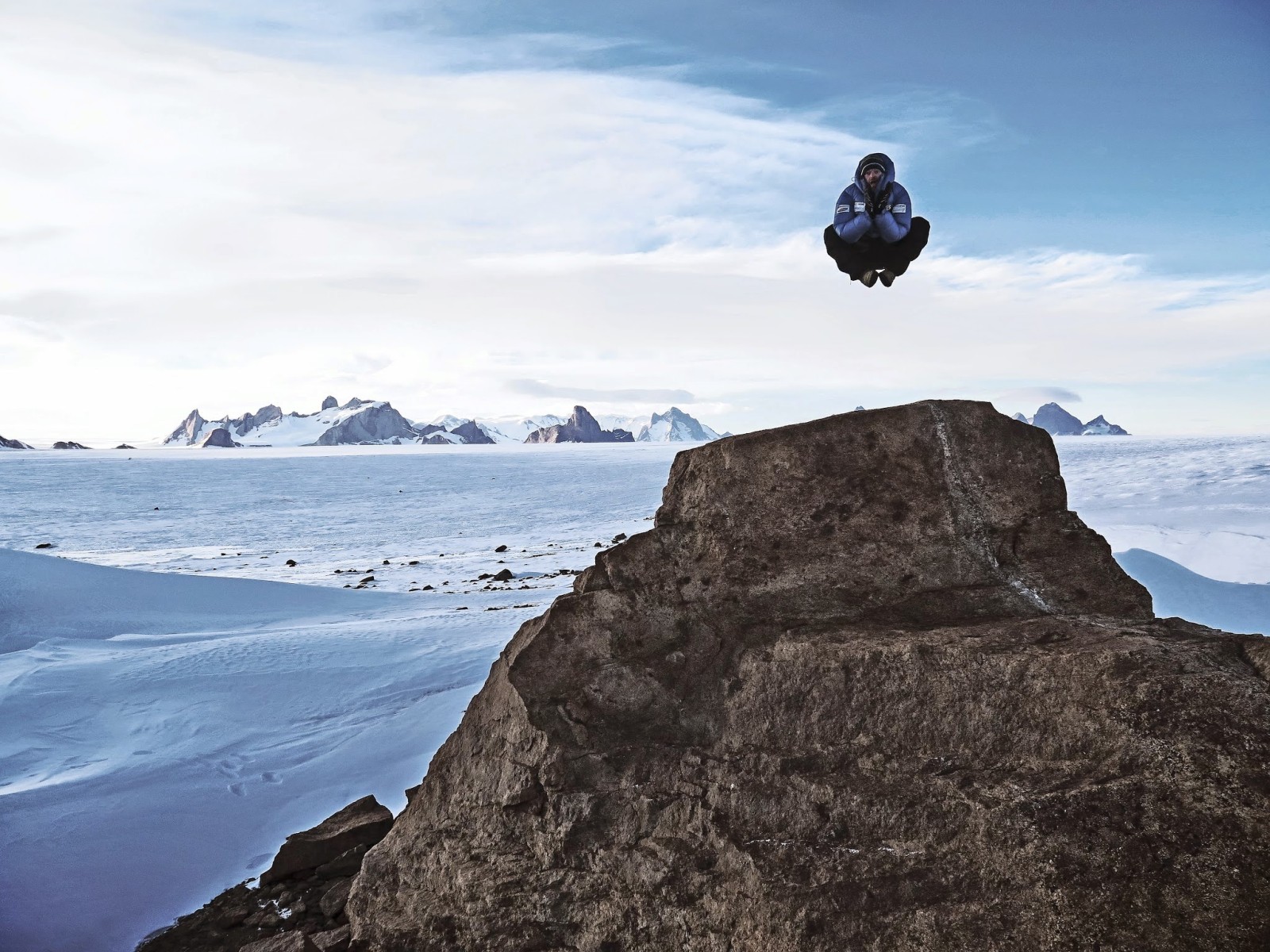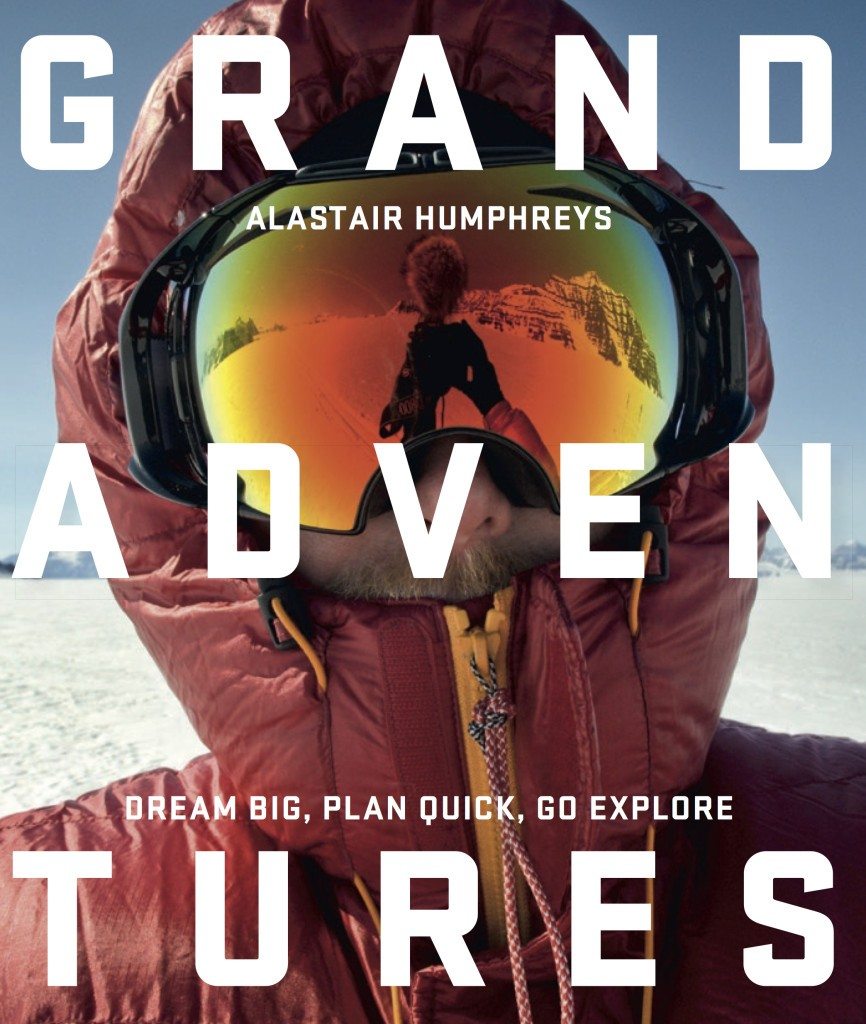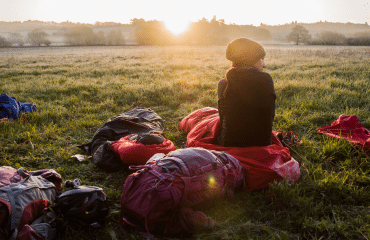Andy Kirkpatrick is a climber, speaker and author. He’s original, funny, outspoken and I have a huge amount of admiration for him. In typical entertaining, straight-talking style, here are some of his thoughts, for my Grand Adventures project, on making adventures happen:
Alastair: What was the first big climbing trip you did, the one that needed a chunk of time, cash and planning as opposed to just a weekend away with your mates?
Andy: In terms of cost relative to my income, I guess my first trip to the Alps was the first big one. I was working in a job where I got £100 a week, and just the bus ticket from Sheffield to the Alps cost me £99! I saved one week’s pay, spent the week’s pay on the ticket and packed in my job. It was winter time and we slept in the woods in a tent. Every penny we spent was considered.
In terms of success, we achieved nothing, but in terms of just doing it, and getting into the mountains and travelling on glaciers, snow holing, bivvying out… it was a great success.
I think people often focus too much on the pin prick of an outcome: the summit, the finishing line, the road ahead. And they ignore the tapestry of the experience. The best climbs I’mve had have often been the ones where we didn’t get to the top.
I think people often focus too much on the pin prick of an outcome: the summit, the finishing line, the road ahead. And they ignore the tapestry of the experience. The best climbs I’mve had have often been the ones where we didn’t get to the top.
When I came back to the UK after that trip, I moved the London and signed on the dole but as my employer said that I’md given up my job (he had a point!), I only got £5 a week to live on. I guess if the urge for adventure is strong enough then you do whatever it takes to make it happen.
In general, I guess I’mm like Paul Ramsden in that I’mve always done trips on a very tight budget. I’mve always put climbing before a career as a climber – if that makes sense. This means I’mve never really had a big budget for trips. Usually it’s about £800 and half of that goes on flights.
My trip to Antarctica this year was paid for by Norwegian sponsors. It cost a huge amount of money, which I find hard to square in my head when I saw so much poverty in South Africa where we flew to Antarctica from. Not to mention that it would have been enough to fund me for the rest of my life for my trips away!
Alastair: How long had you been climbing before you decided to make it your career, in other words earning your living from it?
Andy: I was working at the outdoor shop Outside in Hathersage in Derbyshire for about seven years (still the best job I’mve ever had), and I slowly started to pick up work writing for magazines and doing a bit of speaking.
The Foot and Mouth epidemic had a huge impact on the shop, so I volunteered to drop down to 3 days a week, which suddenly free’d up a lot of time for me to develop my writing.
I became the gear editor for High Magazine, then Snow and Rock started to sponsor me (even though I was still working at Outside at the time who were a competitor).
After I soloed the Reticent Wall, I came back to work and knew my heart was no longer in it. It was time to move on and I decided to focus all my time on being a pro climber (whatever that was!).
Looking back, I had so many opportunities that I turned down due to loyalty, or having too high standards. I focused more on going climbing and less on making a career out of what I’md done. I remember selling Bear Grylls some One Sport boots for Everest when I was working at Outside. He’s been trading off that ever since!
I focused more on going climbing and less on making a career out of what I’md done.
I don’t think most people make a career out of adventure (although there does seem to be a raft of “career adventurers” at the moment). All that most of us realistically do is to cover our costs and make a little extra.
It takes decades of graft and self promotion to get anywhere near having an income close to that of your peers. And when you stop, get old or injured, then what will you do?
My advice to a young person considering it as a career would be to get a trade or a career that you can pick up and drop as you wish. Fill your pot for a while and then go away on a trip. You’ve got work to come back to until the next time you want to go on an adventurer. It’s not healthy to try to make yourself a golden goose.
It’s not healthy to try to make yourself a golden goose.
Alastair: What I’mm trying to do with Adventure1000 is help people make their first big adventure happen. Would you agree that time, money and fear of the unknown are the 3 main things that intimidate and inhibit people?
We are always trying to think of reasons to say ‘no’, rather than reasons to say ‘yes’.
Andy: The writer Menna Pritchard said that these three things are not reasons but excuses, and we are always trying to think of reasons to say ‘no’, rather than reasons to say ‘yes’. I think relationships with others – partners, family, children, friends – play a huge part in what may limit our freedom to leave. It’s a bond that works two ways. You’re perhaps compelled not to go through your circumstances and the love of the people around you, but you also may find that you do not want to go, because you love them too.
But if you do want to go, I’d suggest you think of these three reasons to say ‘yes’ instead:
One day you and everyone you know will be dust, and nothing you said or did, or bought or promised, or saved, or downloaded, or uploaded, or typed, or Tweeted will mean anything, and that day grows closer by the second.
Your future self, 40 years down the line, will hate you if you don’t have the balls to live now.
On your return you will find a new job, another girlfriend/boyfriend, a bed for the night, and all those people who said not to go will be sorry they tried to stop you, and will wish they’d had the strength to go too.
Your future self, 40 years down the line, will hate you if you don’t have the balls to live now.
Alastair: How did you make your adventures happen before you became ‘professional’?
Andy: I found a climbing partner, bought cheap plane tickets from STA, packed our bags and went.
I often joke that I never go on expeditions, only holidays, and I made a point of going on ‘alpine style’ trips where one expedition rucksack and a big holdall was all you needed. The aim was never to pay for excess baggage, and I never did!
This approach works well in South America (I’mve had five Patagonia holidays) and Alaska, and I’mve never personally been interested in doing trips involving dozens of blue storage barrels, porters, LO’s [Liaison Officers] etc.
People often get hung up on gear, and think you need to be sponsored to climb in the big mountains. But there is endless dirt cheap kit that still allows you to be better equipped than superstar teams were in the past. Plus you’ve probably already got most of what you need, or can borrow it from your sad mates who buy kit but will never be brave enough to actually use it!
If you want to do something, then money is no excuse not to.

Alastair: “It’s OK for you – you’re a pro with sponsors. I’mm a normal person with a real job and a real life. I can’t have adventures.” Discuss…
Andy: When I was on £13k a year, working in a shop, taking a month’s unpaid leave each year to go climbing, people with real jobs (doctors, architects, lawyers) would come up to me after my talks and ask how I could afford to do it.
If you want to do something, then money is no excuse not to. Even living on £27 a week on the dole I could still hitch to the Peak District or the Lakes and have adventures as cool as going to Antarctica.
I always had this idea of getting on my bike after signing on (which you did every two weeks) and seeing how far I could cycle in that fortnight. Money is no excuse.
When I came back from Antarctica this year, I hadn’t worked for two months. I had about £20 in my bank and an ex-wife who was pissed off at me for not having looked after the kids for all that time.
This is the reality. But if you work hard and are motivated you can always find money; maybe not fifty grand to climb Everest, but enough to get you to Bolivia or Morocco.
Alastair: What are the disadvantages of deciding to make climbing your ‘job’ compared to just having a normal job and saving up for an annual climbing holiday?
Andy: For me, I need big chunks of time, both to go away (although I try not to be away longer than a few weeks, as I miss my kids) and to write (which is as important to me as climbing). Trying to fit those into a normal career would be very tough, and being my own boss gives me flexibility. I also don’t have any qualifications, skills or a trade beyond what I’mve taught myself. So if I had to get a job it would be back to working in a shop on minimum wage, or being a rep for a company (worse than death!).
A lot of my friends went into guiding but by and large this has killed their climbing habit, as climbing has now just become a job and they prefer to ski in the winter and cycle in the summer.
Alastair: If someone dreams of climbing a big mountain (let’s say Everest as that’s probably the peak that appeals most to non-climbers), how should they go about making that happen?
Andy: I’md recommend starting off by doing the 14 Peaks in Wales over a weekend, then the Bob Graham in the Lakes over a longer weekend, and then the Ramsey round in Scotland. After that try ticking off all the Munros and all the routes in Classic Rock. While undertaking this try reading as much about the history of British climbing, all the classics. After that try and tick off all the classic Scottish winter routes, especially the classics on Ben Nevis, as well as the more remote ones in the Highlands.
By now you’ll be pretty solid, so it’s time to go to the Alps. How about ticking off all the 4000 metre peaks over a few years, as well as throwing in some ice climbing and ski mountaineering in Norway?
The North Face of the Eiger, Matterhorn and Grande Jorasses should come next (at least one of them to be climbed in winter), giving you a boost for a trip to Alaska to climb Denali, and one to climb Agoncagua. You could tick off some more seven summits if you want, but you’ve just done the cheapest two, so I’md leave it at that (all the other tick lists are simply short hand for amazing climbs and adventures).
By now you’ll be ten, maybe 20 years down the line from starting up Snowdon, and you’ll now have had enough climbing and incredible days on the hill to know that Everest is a waste of time.
You’re no longer a clueless dreamer, but someone who understands the harsh reality of the mountains as well as their joy.
For most people, no real happiness can come from climbing Everest, only heartache.
Spend the cash on climbs for your soul not your ego.
Spend the cash on climbs for your soul not your ego.
Alastair: If you were a millionaire, would you still do public speaking, write books and blogs and so on?
Andy: Yes – and I’md do more! If you have to be paid to do it, it’s a job, if getting paid is a bonus, it’s a passion, if you’d pay to do it, that’s life itself.
If you have to be paid to do it, it’s a job, if getting paid is a bonus, it’s a passion, if you’d pay to do it, that’s life itself.
Alastair: Which professional adventurers (as opposed to people like Paul Ramsden who climb for the love of it but no more than that) do you respect the most, and why?
Andy: It would have to be the Norwegians, as they just cannot get away with any bullshit whatsoever, and they have very strong morals and ethics about the truth in expeditions. Someone like Bear Grylls is a total clown in the eyes of the Norwegians (but so too is Ran Fiennes). You just find that they really know their stuff.
Some hapless punter who’s been guided on a ‘last degree’ [walking the final degree of latitude – 60 miles] to the Pole could never make a career as a ‘polar explorer’ as happens in the UK.
People like Børge Ousland, Rune Gjeldnes and Robert Caspersen set the standard in extreme adventuring, both in how how they do it, and how they go about promoting what they do.
Some hapless punter who’s been guided on a ‘last degree’ to the Pole could never make a career as a ‘polar explorer’ as happens in the UK.
Alastair: Finally, if I gave you £1000 for an all-inclusive adventure, what would you do?
Andy: For a true adventure I’md have to be going somewhere new, and doing something I’md not done before. So maybe I’d get to the start of the PCT and see how far I could get!
Follow Andy on Twitter and buy his fantastic books.
My new book, Grand Adventures, is out now.
It’s designed to help you dream big, plan quick, then go explore.
The book contains interviews and expertise from around 100 adventurers, plus masses of great photos to get you excited.I would be extremely grateful if you bought a copy here today!
I would also be really thankful if you could share this link on social media with all your friends – http://goo.gl/rIyPHA. It honestly would help me far more than you realise.
Thank you so much!
Grand Adventures from Alastair Humphreys on Vimeo.





Words of wisdom. Inspiring and brutally honest. Puts a lot of things into perspective for an amateur like me. Cheers.
Definitely a great conversation, very deep and meaningful.
Great, honest piece. Alas my current self hates me let alone my future self…..